57 Meditations on Kicking @$$ in Business and Life"4.8/5 stars" on Amazon
7 Tips To Get Your Site On The Front Page of Google When People Search Your (Common) Name
A few months ago I was launching my own personal Web site and I had the simple goal of getting it on Google’s front page when people searched my fairly common name: Rob Kelly.
Well, a search of “Rob Kelly” now places me first on Google’s front page.
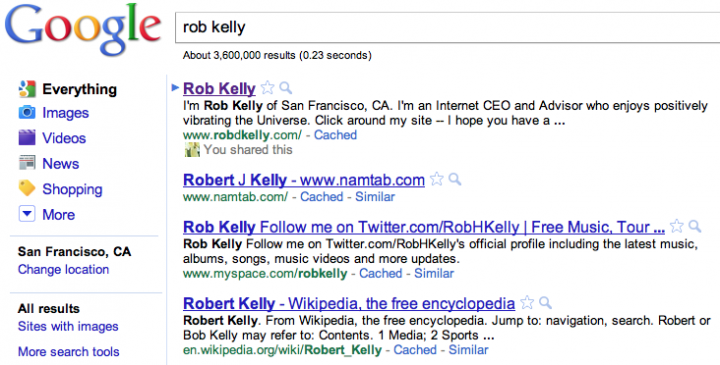
I enjoy sharing learnings from such projects so I decided to deposit some of the knowls that helped get my personal website on Google’s front page right here in this article.
Warning/Alert: If you’re looking for SEO trickery to figure out how to game Google’s search engine, you’ve come to the wrong place! In fact, if that’s you, please leave right now…I don’t want your kind here!
The tips I’m sharing are logical/legitimate approaches to improving your Google website ranking in hopes of getting on the front page of Google in an honest fashion.
Ok, for the rest of you honest folk, let’s do it!
How To Get Your Personal Website On Google’s Front Page
Let’s start with the obvious: The easiest method to get #1 on Google’s search results when people search “Your Name” is to start by naming your site “YourName”.com — if you already have YourName.com then you can skip to Google Front Page Tip #3 below.
I began this “Google Front Page” project researching other common names for people and seeing who ranked on Google’s front page (which typically lists 10 results).
My unscientific study started with picking the most common people’s names (like Rob Kelly) which I found on the Web and then looking at only the ones that came up on the first page of Google when you searched the name of the person behind the site (e.g. if you search “Joseph White” then JosephWhiteDP.com comes up on Google’s first page…and comes up first (hence the “1” in the Rank on Google column).
The table below is a list of 20 examples of personal websites that ranked in the #1 position on Google’s front page — and then further below is the full list of 41 personal websites I looked at that had anywhere from a 2 to 10 Rank on Google (again, that means they cracked Google’s front page).
20 Top Personal Websites That Come Up First When You Search A Common Name
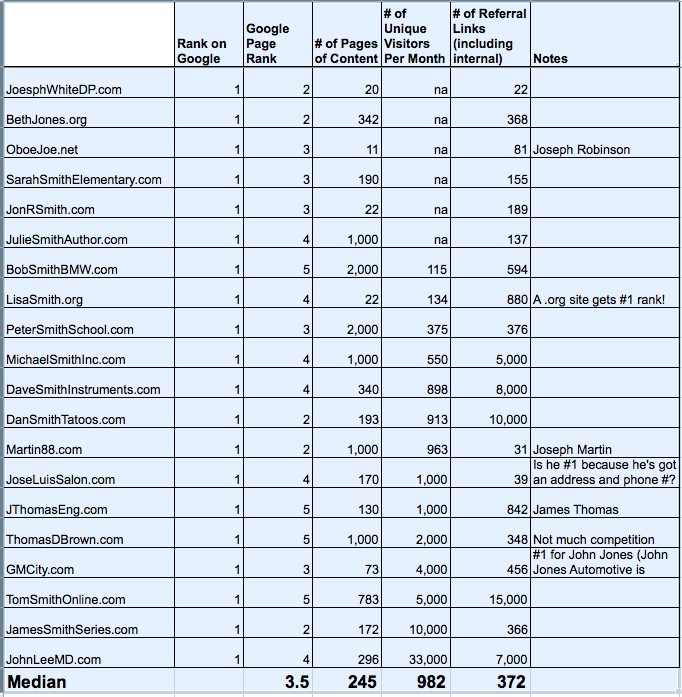
I used SEOBook (see How To Have X-Ray Vision About Your Competition) to help me with all these Google website rankings.
Note: I excluded exact match .com names (such as JosephWhite.com, BethJones.com, etc.) because Google almost always gives them a Google site ranking of #1 so there’s not as much to learn there.
Ok, so let’s cover some of the things I learned from looking at these 61 personal website examples and why they ended up ranking on Google’s front page.
Google Front Page Tip #1: Use A “.com” For Your Domain Name
Nearly 84% (51) of the 61 personal website examples that made it to the front page of Google were .com’s.
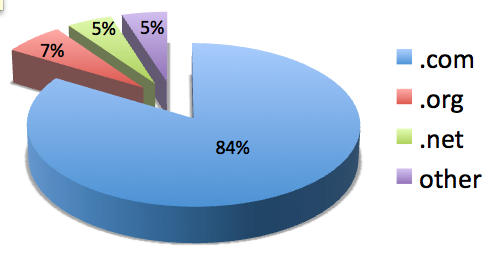
Four domain names were .org and three were .net and there was even a .me, .info and .la.
However, you’ll also notice that half of those non .coms were exact matches with the person’s name (i.e. LisaSmith.org, BobJones.org, Beth Jones.org, LisaSmith.net and SteveJones.me).
So, my advice: If you can get your exact name in a .com, .net or .org you should grab it; but if your exact name is not available in those domain suffixes, I suggest you buy a .com domain name and follow the rest of my advice below.
Google Front Page Tip #2: Your Domain Name Should Have Your First And Last Name Somewhere
If you can’t a .com, .net or .org domain name with your exact first and last name (i.e. RobKelly.com), then I recommend that you consider four other options:
1) List your full name followed by a keyword
e.g. “RobKellyCEO.com” or “RobKellyAdvisor.com” or “RobKellyInternet” — I chose CEO, Advisor and Internet as the follow-up word since those are keywords related to what I do in life.
2) List a keyword followed by your full name
e.g. “CEORobKelly.com” or “AdvisorRobKelly.com” or InternetRobKelly.com”
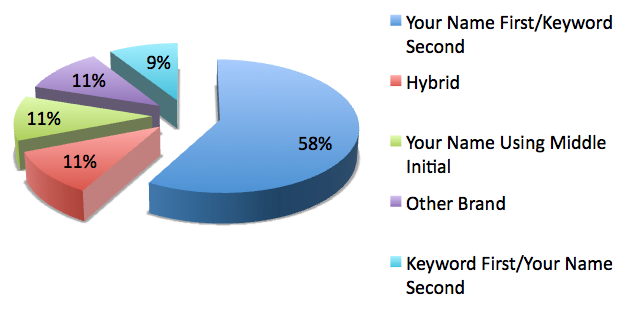
3) Use your full name with middle inititial
e.g. “RobDKelly.com” (the name I chose!)
Note: I chose to use my full name with middle initial for stylistic reasons — I believe that if I had chosen options #1 or 2 above that I would have done just as fine with my Google website ranking.
4) A Hybrid (part of their name along with some other keyword)
e.g.You’ll notice that some of the people’s Web sites used a combination of their name and keyword with great success.
e.g. “OboeJoe.com” (by Joseph Robinson) and “JessicaKnows.com” by Jessica Smith).
Finally, if you don’t like any of the above and want to name your Web site something that doesn’t contain any part of your name, there are some success stories such as “VitalInformation.com” by Steve Smith and “VoiceTeacher” by David Jones.
But, why make your life so hard — stick to the 4 recommendations above (I personally prefer the first three!).
Note: There’s a good interview with a Search Marketing expert here called: How To Select The Best Domain Name To Attract Search Engines.
Your Web Site Has To Meet Key Metrics
Finally, to get listed on the Google front page you have to put up good numbers.
In the spirit of Inevitability Thinking — I wanted to know what metrics for your Web site would make it inevitable that you would rank on page 1 of Google for your site.
So, now we have four more tips to add:
Google Front Page Tip #3: You Should Have A Google PageRank Of At Least 2 (Ideally 3 or 4)
Your Web site home page should have a Google Page Rank of at least 2 and ideally it’s 3 or 4 or more.
What is Page Rank? It’s named after Google Co-founder Larry “Page” and is a rank (on a scale of 1 to 10) that Google assigns individual web pages within your site. Page Rank is reported to be heavily weighted as to the quantity and quality of links to your site. PageRank is a trademark of Google, though Stanford University owns the patent for it.
Click 9 Simple Tips For Showing Up In Search Results for some approaches to increasing your Page Rank (or Google Juice as some people call it).
That said, if you can follow all the other tips I’m providing, your Google Page Rank will by virtue increase from zero.
Google Front Page Tip #4: You Should Have 200+ Pages Of Content
The typical Web site (of the 61 I looked at) has a median of 211 pages of content that are being indexed by Google.
RobDKelly.com currently has about 150 articles in it so that sounds about right to me. And by Content, I’m referring to any page of honest, quality content that you put up: articles you write, photos you take (ideally with some commentary), videos you take.
You’ll notice from the two Personal Website tables in this article that very few sites were able to get on the 1st page of Google with 10 or fewer pages of content — such sites are referred to as “Brochureware” and Google doesn’t typically rank these sites highly.
Google Front Page Tip #5: You Should Have 1,000+ Unique Visitors
If you have 1,000 or more unique visitors per month, you will increase your chances of a top Google website ranking, according to the median of the 61 sites I looked at.
My own personal experience was the same: I got on page one of Google right when I passed the 1,000 monthly uniques threshold.
Click the Increasing Web Traffic section to find some articles related to this.
Google Front Page Tip #6: You Should Have 400+ Referral Links
The 61 top personal websites had a median number of referral links of 485.
This means that 485 pages on the Web linked to their personal website.
note: links to you from other websites are most valuable but it is also valuable to have internal links (i.e. you link from one page of your site to another.
Check out How To Get Incoming Links To Your Blog or Web Site for some tips on getting other Web sites to link to you.
41 More Top Personal Websites With High Google Website Ranking
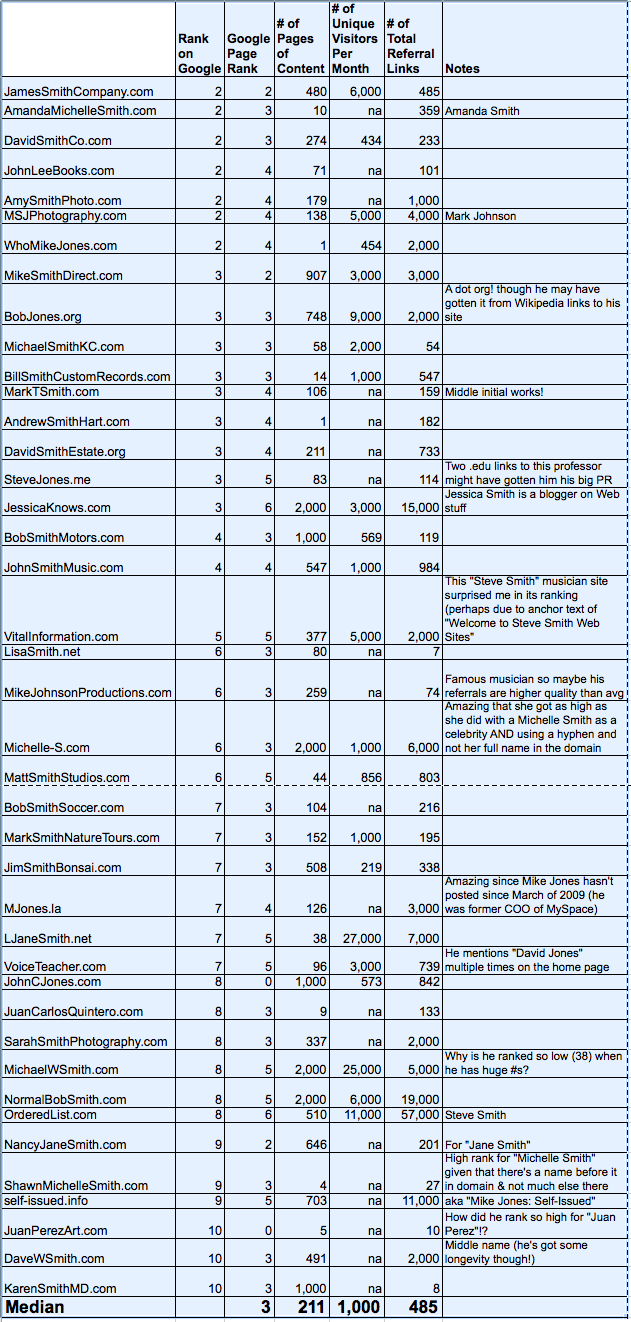
Google Front Page Tip #7: You Should Be Patient (Allow A Few Months)
It took RobDKelly.com four months to get on Google’s front page.
This is fairly common as Google’s spider crawls your Web pages and begins to reward you for things like other people linking to you or simply for longevity (serious, just keep at it and Google will reward you).
And if you have many other people’s Web sites who use your name — including celebrities — you may have to wait longer.
Final Thoughts
These tips I’ve given are no guarantee that you’ll get in the Google top 10 search results for your own name — there could be many exceptions (including famous people having your same name).
Additionally, as the Internet population grows, the key metrics I listed will likely increase.
But, barring exceptions and taking into account population growth, I believe if you follow/meet most of the Google front page tips I’ve listed, you’ll get on the Google front page over time
Best of luck!
